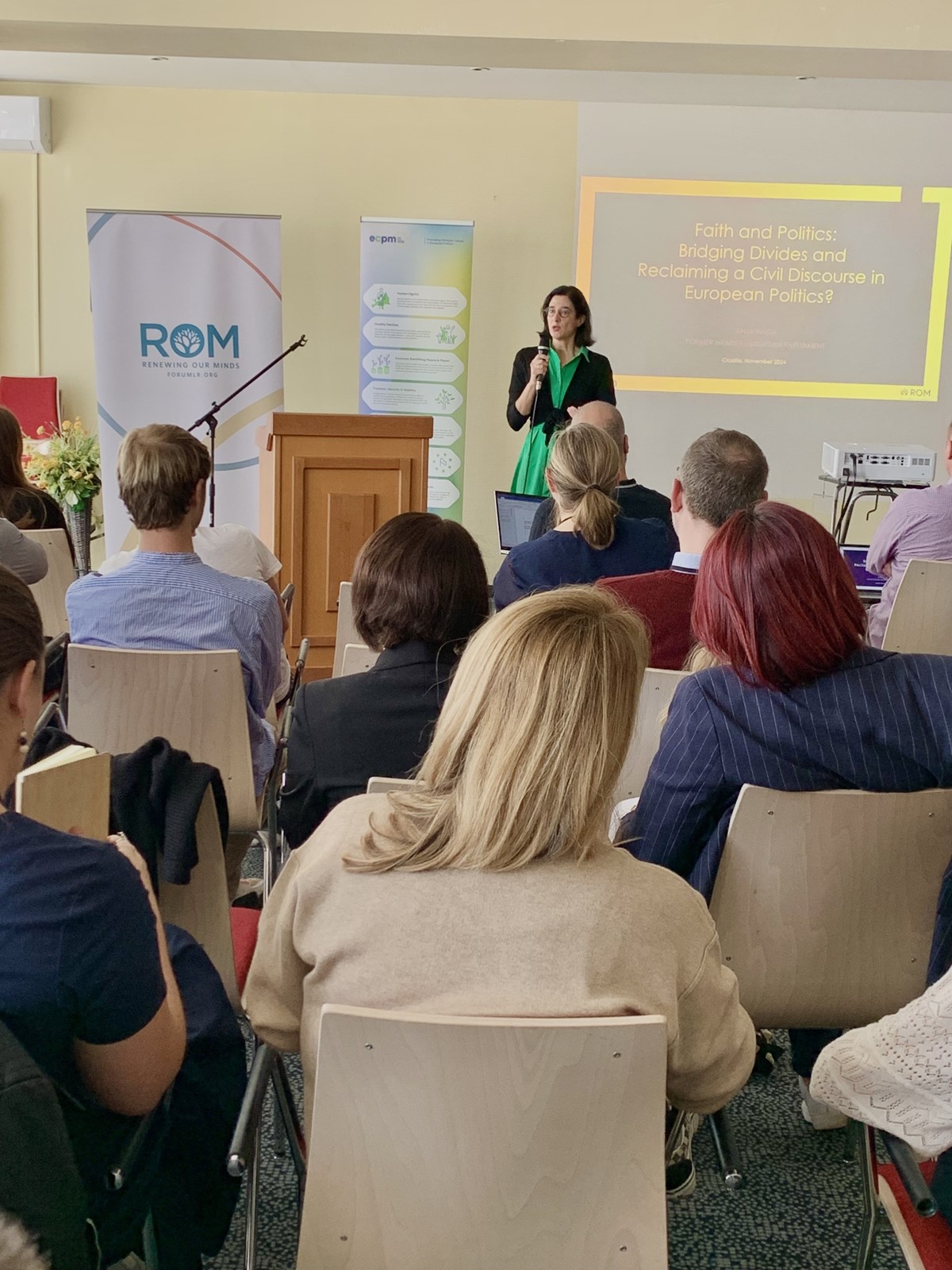
Monday, November 4, 2024
Faith & Politics: Bridging Divides and Reclaiming a Civil Discourse in European Politics
For four full days, politicians, entrepreneurs and members of the civil society gathered in Crikvenica, Croatia to explore peaceful and faith-based solutions to today's polarization, especially in politics. ECPM partnered with Renewing our Minds (ROM) organisation for this event, an organization focused on peace and reconciliation in Central/Eastern Europe and the Balkans.
Bojan and Rachel Ruvarac, the CEOs of Renewing our Minds, opened up the event encouraging everyone to be fully present, to keep an open mind, and to be intentional in connecting and networking.
On the first day, former prime minister of Slovenia and former MEP Lojze Peterle, together with pastor Carlton Deal talked about fostering unity among people(s) and concluded that investing in and building community is a useful countermeasure to division and segregation.
Heather Staff, councilwoman for Islington, a suburb on the Northside of London, approached the separation of Church and State on the second day of the conference. She reviewed the complicated history between these two institutions in the U.K. as well as on the continent, and pointed to both the positive and negative effects of the relationship. She mentioned the Christian figures like William Wilberforce and the Cadbury family, Quakers who fought against the slave trade and child labour, as examples whose politics were informed by their faith and convictions. During the Reformation, Christian leaders and pastors were critical of the mainstream Church becoming corrupt and political, showing bias and using religion as a manipulative tool.
A panel discussion led by Rachel Ruvarac described what the juxtaposition of faith and politics looks like in practice; the people on the panel were journalists, entrepreneurs, elected officials and non-profit founders from U.K., Spain, Montenegro, the Netherlands and Kosovo. Some described how religion is inextricably linked to their national identity and questioning or changing your religion/ denomination is tantamount to betraying your country. Others emphasized the strict separation their countries make between religion and politics and about religious diversity being the basis for cohesion of the city or community.
On Saturday, Anja Haga, former MEP on behalf of Christian Union (Netherlands) and the ECPM, delivered a lecture on finding consensus on protecting the environment. She provided examples from her work in the European Parliament, when working on the Nature Conservation Law and on the protected status of some animals. Coming to a compromise is extremely difficult in politics, especially at European level, since the parliamentarians each represent very different groups of people and national interests. The former MEP emphasized that creating a scenario where everyone feels heard and that they got something out of the negotiations is paramount, and even then last-minute surprises may appear and undermine the consensus or compromise. She encouraged everyone to hold fast to their core values but to be willing and open to always hear the other side and extend the benefit of the doubt. Later that day, she lead a workshop on living plastic-free and the urgency of eliminating one-use plastics from our daily consumption.
Dr. Noemi Mena Montes and Klariska ten Napel led two other workshops focused on the media contributing to the polarisation (Dr. Montes) and on St. Benedict's approach to work and prayer/ meditation as a healthy rhythm of living (Ms. ten Napel).
On the last day of the conference, we had the pleasure of hearing from MEP Davor Ivo Stier (EPP, Croatia) who shared about instances in his career when his faith and ethics made a difference and broke through walls and obstacles in negotiation talks. He served as a diplomat in the foreign service of Croatia and advised the Prime Minister who negotiated Croatia's accession to the EU. He stressed the importance of building trust between politicians and counterparts, keeping your word and leading with courage and integrity- these values move people from a confrontational stance to a cooperation one.
The last lecture came from Marko Marina, professor of Early Christianity at the University of Zagreb, who provided a historical analysis of Jesus and his context. He acknowledged the existence of various historical sources who make some reference to the existence of Jesus in the first century, but underlined that the most reliable and complete account are the four Gospels. The strongest criteria for this is the contextual credibility, meaning Jesus' teachings and things described in the Gospels fit into what we know about the first century context.
The participants had the space and opportunity to reflect on the complex (and complicated) aspects of being a person of faith involved in the political or social aspects of one's own country. The nuances of this overlap and interplay were acknowledged and that it is not always black & white, positive or negative. The speakers offered encouragement and examples which centered on the Christian belief that every person is created by God, with intrinsic worth, and that in the face of polarization and fragmentation we should prioritize the person/ our neighbour, that we should seek the common good over our desire or need to be right.